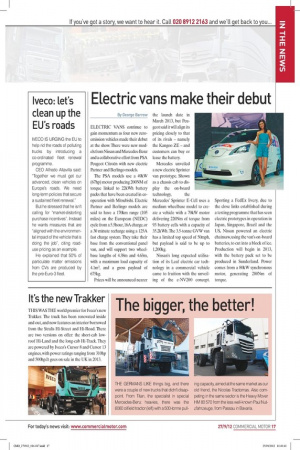Electric vans make their debut
Page 11

If you've noticed an error in this article please click here to report it so we can fix it.
By George Barrow
ELECTRIC VANS continue to gain momentum as four new zeroemission vehicles made their debut at the show. There were new models from Nissan and Mercedes-Benz and a collaborative effort from PSA Peugeot Citroën with new electric Partner and Berlingo models.
The PSA models use a 49kW (67hp) motor producing 200NM of torque linked to 22kWh battery packs that have been created in cooperation with Mitsubishi. Electric Partner and Berlingo models are said to have a 170km range (105 miles) on the European (NEDC) cycle from a 5.5hour, 16A charge, or a 30 minute recharge using a 125A fast charge system. They take their base from the conventional panel van, and will support two wheelbase lengths of 4.38m and 4.63m, with a maximum load capacity of 4.1m3, and a gross payload of 675kg.
Prices will be announced nearer the launch date in March 2013, but Peugeot said it will align its pricing closely to that of its rivals – namely the Kangoo ZE – and customers can buy or lease the battery.
Mercedes unveiled a new electric Sprinter van prototype. Shown as a chassis cab to display the on-board technology, the Mercedes’ Sprinter E-Cell uses a medium wheelbase model to create a vehicle with a 70kW motor delivering 220Nm of torque from 93 battery cells with a capacity of 35.2kWh. The 3.5-tonne GVW van has a limited top speed of 50mph, but payload is said to be up to 1,200kg.
Nissan’s long expected utilisation of its Leaf electric car technology in a commercial vehicle came to fruition with the unveiling of the e-NV200 concept. Sporting a FedEx livery, due to the close links established during a testing programme that has seen electric prototypes in operation in Japan, Singapore, Brazil and the US, Nissan powered an electric chainsaw, using the van’s on-board batteries, to cut into a block of ice. Production will begin in 2013, with the battery pack set to be produced in Sunderland. Power comes from a 80kW synchronous motor, generating 280Nm of torque.










































